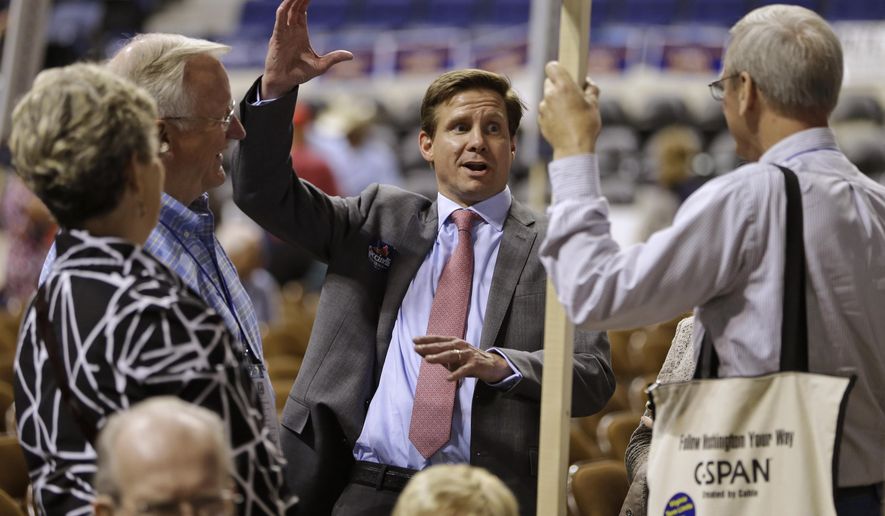The Republican Party of Virginia has a crowded field of candidates seeking the gubernatorial nomination, but it hasn’t settled on how it will choose its nominees for governor, lieutenant governor and attorney general, among others.
With a looming Tuesday deadline for announcing a nomination process, the Virginia GOP has said it would like to hold a convention instead of a primary on May 1, even though coronavirus distancing protocols could hamper such a gathering.
But more than 30 of the 72 members of the party’s State Central Committee have been seeking an alternative such as a firehouse primary or a canvass of GOP voters.
“While the Democratic side chose a long time ago, a primary process and the candidates know the path that they need, the Republican side has no path right now. It changes from day to day, depending on who has a little more influence on the State Central Committee of the Republican Party than the other,” said David Ramadan, an adjunct professor at George Mason University’s Schar School and a former member of the Virginia House of Delegates.
Mr. Ramadan said neither side has enough votes to secure the necessary two-thirds supermajority to amend the rules and allow for an “unassembled convention,” where votes for each round could be cast on a drive-by basis.
Meanwhile, a Richmond Circuit Court on Friday rejected a lawsuit brought by one of Virginia’s Republican gubernatorial candidates over the party’s tentative decision to hold a convention. Retired Judge Margaret Spencer, who was serving as a substitute, ruled that state Sen. Amanda Chase had no standing to bring the lawsuit.
Ms. Chase, a pro-Trump firebrand, is seeking the GOP nomination for governor along with Delegate Kirk Cox, former speaker of the Virginia House; former think tank CEO Peter Doran; marketing executive Pete Snyder, a former Fox News contributor; former Trump Defense Department official Sergio de la Pena; small-government advocate Merle Rutledge Jr.; Army veteran Kurt Santini; and businessman Glenn Youngkin.
Ms. Chase, who the Virginia Senate recently censured for expressing support for rioters at the U.S. Capitol on Jan. 6, filed the lawsuit claiming she was being “selectively penalized” for her political views.
“I am the clear republican front-runner at this point,” Ms. Chase said last week on WRVA-AM’s “The John Reid Show.” “What I’m trying to do is avoid a situation in which the people of Virginia are not allowed to participate in the nomination process to seek a Republican nominee for governor.”
The GOP candidates have focused largely on criticizing Gov. Ralph Northam’s handling of the coronavirus pandemic and its impact on schools, businesses and personal liberties. Reopening schools has become one of the biggest issues for Republicans looking to set themselves apart not only from each other, but Democrats as well.
Mr. Snyder, an investor who was the GOP’s pick for lieutenant governor in 2013, stressed that his campaign has been on the forefront of pressuring school districts to fully reopen and they raised $100,000 to help recall “obstructionist school board members” across the state.
“I think being an outsider conservative businessman is a huge help. Most people, most Americans don’t feel like those in leadership during the pandemic have done a good job at all,” Mr. Snyder told The Washington Times. “If I’m trying to be the governor of Virginia and applying for that top spot, why would I not take on the number one issue facing us right now? And if it gets fixed and our kids are back and they’re learning again and teachers are back in the classroom that’s fantastic.”
A former public school teacher, Mr. Cox said his approach stands out because it focuses on addressing learning loss rather than just reopenings.
Dubbed the “ALL Initiative,” the proposal calls for using federal funds to create a robust tutoring program through the local school districts, summer school remediation programs, and aid to families looking to invest in supplemental learning resources. It also calls on the DOE to create a screening process to determine where students are at.
“Let’s say for example that you are really behind — six months — that might call for a one on one tutoring. If you’re not quite as far behind — two to three months — you could probably do it in cohorts, two to five,” Mr. Cox said. “It’s all hands on deck.”
Mr. Ramadan, however, warned that focusing only on pandemic-specific policies is only a short-term solution.
“Opening the schools is a short-term issue. It’s a sound bite,” he said. “So we get to the general election, people walking into vote in November, and opening the schools should not be a problem at that point They’re not going to have a real winner of an issue at hand in November.”
Mr. Northam cannot run for a second consecutive term. Democrats are selecting their nominees in a June primary.
The Democratic field for governor includes Lt. Gov. Justin Fairfax, state Sen. Jennifer McClellan, Delegates Jennifer Carroll Foy and Lee Carter, and former Gov. Terry McAuliffe.
• Gabriella Muñoz can be reached at gmunoz@washingtontimes.com.




Please read our comment policy before commenting.